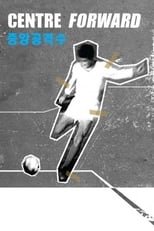After the DPRK (Democratic People’s Republic of Korea) qualified for WC 2010, Koryo Studio re-mastered and re-released Centre Forward (중앙공격수) on DVD. It has been shown in several film festivals, including the 2011 edition of the Berlin 11mm International Film Festival.
With its black and white production values and moralistic lessons, this 1978 cinematic propaganda from North Korea reminds me of the 1950s TV series Rin Tin Tin and its like. In those days, American television portrayed and reinforced American values of virtue, rescuing people from bad Indians, and being good to dogs.
The Story
The story actually is a perennial one, that of a rookie striker making a team, but playing so badly that he fears he will be kicked off the team. He turns to his older fellow striker for advice, but is only offered a beer.
In the end, the young man exemplifies Juche, the Korean spirit of self-reliance, and he works extremely hard to develop and improve his fitness and skill. His example in turn inspires his teammates, including the older jaded players. When the team wins, even the chairman of the club sees his error and admits, “I was clinging to some older players to save my reputation.”
North Korean filmmaking
After the end of World War 2 and Japanese occupation, Korea was split into 2 countries in 1950. Kim il Sung became Supreme Leader. In 1966, at around the age of 22, his son, Kim Jong il, ran the Propaganda unit, whose purpose was to glorify the Leader and promote nationalist unity. Being a huge cinephile, Kim Jong il maintained such close control of the motion picture side that he is considered the executive producer of all his countries’ films. In 1973 he wrote a book, “Yeonghwa yesullon” (On the Art of the Cinema), which became the guide for North Korean filmmakers.
According to Kelley Dong in May-2018, Kim Jong il saw film as a seed for planting ideology in art, thereby advancing the goals of North Korean revolution and construction. However, Dong maintains that:
“The sensationalized fantasy of North Korea’s ‘propaganda machine’ imagines that its filmmakers are passive laborers in a factory, churning out shoddy products for a brainwashed audience. On the contrary, the films of the DPRK (Democratic People’s Republic of Korea) are frequently rich with poetic detail and relentlessly melodramatic.”
Kelley Dong, May-2018
The same year this film was produced, Kim Jong il decided to take the short path to improve the quality and reputation of North Korean films. He kidnapped prolific South Korean Director Shin Sang-ok and his former wife and leading actress Choi Eun-hee. They were subjected to DPRK ideology until Shin finally agreed to make films for Kim. They produced 6 films before escaping in 1986, seeking asylum in a US Embassy while traveling in Vienna.
Cultural norms
There are interesting cultural scenes in the film, such as the striker’s sister, a successful athlete (dancer) herself, goes to the coach and implores him to do whatever is necessary to get the best performance out of her brother. It reminded me of when Tony DiCicco was offered the coaching job for China’s WNT and was told he could hit the players. There are also other scenes to show family roles and normalcy. The striker’s mother washes her son’s kit by hand at the sink, and his dancer sister irons it. The older striker’s mother shops in a store full of beer, and laughs that he drinks it like water.
Raised in the bosom of the Party we will triumph everywhere
The theme song for the film is quite rousing
…
Oh we are sportspersons of the Leader.
Let us glorify the honour of the motherland, let us glorify.
The soccer in the film is okay, mostly of practices, but it appears to have been speeded up. I was a little confused by the balls they were using, which appeared to be brown leather from the 1950s, not the polyurethane balls of the 1970s. And all the male stadium fans are wearing suits and ties. The striker’s grueling practice of hitting 100 goals against opposite concrete walls is interesting.
Koryo Studio is an art studio and travel agency in Beijing, specializing in North Korean art and travel, and run by an Englishman. They also produced the 2002 documentary Game of Their Lives, about the North Korean team that played in WC 1966 in England.
6 Soccer Movie Mom Rating = 6
Resources:
- Released: 1978 (North Korea)
- In Korean with English subtitles.
- The Korean title is 중앙공격수
- IMDB
- Directors: Kim Kil In , Pak Chang Song
- Stars: Kim Chol
- Watch the Trailer – a curious trailer in English voiceover
- Koryo Studio Website

